FEATURE ARTICLE -
Issue 95: March 2024, Regional Bar
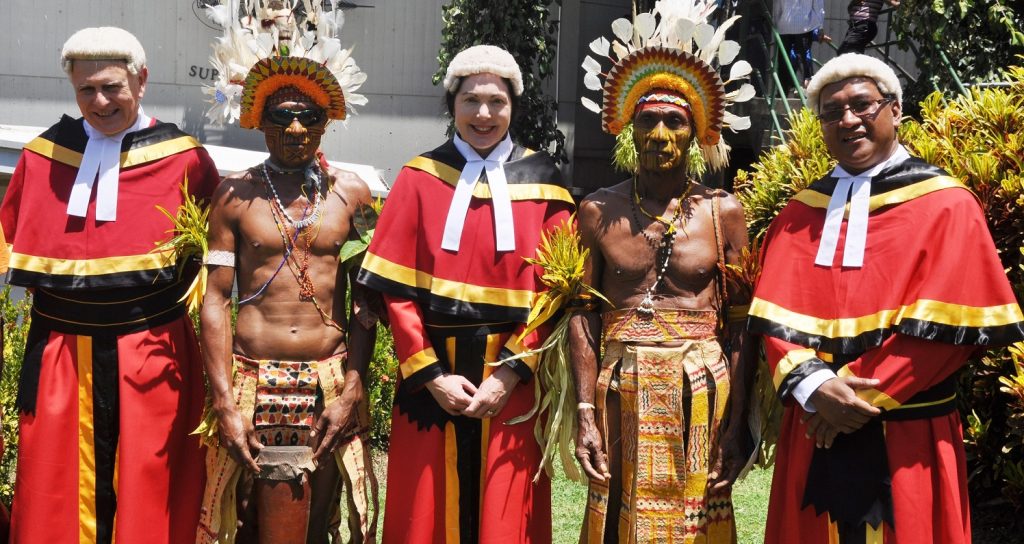
Logan, Collier and Kassman JJ and members of clan of Kassman J.
Brief Background about Papua New Guinea and the Judicial System
The Independent State of Papua New Guinea (“PNG”) is affectionately and justifiably known as “the land of the unexpected”. Only 5km separates PNG from the nearest land portion of Australia.
PNG is the third largest island country in the world, with over 800 different languages. Although the population is officially around 10 million, recent authoritative studies put the population at well over 15 million. The country is known for its magnificent flora and fauna. It is also known for the resources it possesses.
Sir Julius Chan, a former Prime Minister, told me Papua New Guinea was known as an island of gold surrounded by a sea of oil. Of course, apart from resources such as gold, copper, nickel and gas, it has a significant agricultural industry. The coffee industry, in particular, is a major employer.
Section 1 of the Constitution of the Independent State of Papua New Guinea (“Constitution”) provides that “Papua New Guinea is a sovereign, independent State by the name of the Independent State of Papua New Guinea”.
The Constitution, which came into force on Independence on 16 September 1975, is very lengthy. It consists of National Goals and Directive principles, followed by over 270 sections and detailed schedules.
Broadly speaking, the common law and equity in England prior to independence were adopted – by force of the Constitution – on Independence. Having said that, the courts in PNG regularly apply and follow both Australian and English authorities. From my observations, the regularity that they do so is however decreasing as the PNG courts have developed established principles in many areas of the law (making it unnecessary to refer to overseas authorities).
In some instances, PNG statute law is based on Australian legislation – especially in the area of criminal law – so the Australian authorities are often referred to by the judges.
PNG is a litigious country, with litigation involving the Constitution, human rights, landowner disputes and judicial review of Ministerial decisions being common.
The courts in the country are the District Court, National Court and Supreme Court. The National Court is the main trial court, while the Supreme Court principally hears appeals and constitutional matters. The judges – apart from acting judges – are appointed as both National and Supreme Court judges. The District Court consists of Magistrates. The Court hierarchy is expected to materially change in the next 12 months.
There are currently 40 judges in total in PNG by reason of, until recently, the statutory capping on the number of judges that could be appointed. In the last few months this capping has been increased to 60, with the Attorney-General recently indicating it is proposed to further increase the restriction on the number of judges capable of being appointed to 200.
Australian Federal Court Justices Logan and Collier have been members of both the National and Supreme Courts since September 2011. They primarily adjudicate Supreme Court matters, usually hearing appeals with two other judges.
Expatriate lawyers can be appointed as judges for up to three years (but their terms can and often are extended on numerous occasions). National lawyers are, in contrast, appointed for 10 years (but again, their terms can and often are extended).
There are no jury trials in PNG.
PNG is a litigious country, with litigation involving the Constitution, human rights, landowner disputes and judicial review of Ministerial decisions being common.
Practice in PNG
At the end of 2023, there were about 1400 lawyers holding practising certificates in PNG. Well over 200 of these lawyers worked for government departments or statutory bodies. A very large proportion of lawyers in PNG are sole practitioners.
Counsel from overseas are generally issued practising certificates in the category of “Overseas Counsel”. They pay a higher annual practising certificate fee than local lawyers. The profession is fused and there is no independent bar. Having said that, many lawyers specialise in litigation advocacy.
Significantly, amendments were made to the Lawyers Act in 2021 (which were certified on 23 February 2022). Most of the amendments are now in force and include distinguishing between citizen and non-citizen lawyers. The Attorney-General harbours extensive powers in relation to, for example, the issuance of practising certificates (impacting and reducing the role and power of the Law Society to issue practising certificates). There is a very prescriptive reference to whether a person is a fit and proper person. It contains a subsection, for example, that a person is not a fit and proper person if the lawyer:
“is designated as a terrorist or terrorist organisation by the United Nations Security Council and its Committees or under the United Nations Financial Sanctions Act 2015”.
It also contains a subsection that the Attorney-General may determine that a person is a fit and proper person to be admitted as a lawyer even though the person does not satisfy other fit and proper person criteria. The Attorney-General “shall not exempt the same person of the fit and proper person twice consecutively”.
The PNG Law Society has raised concern about some of the amendments and a few provisions relating to the fit and proper person assessment have not been gazetted (so have not yet come into force) while the concerns are being considered.
The Bar Association of Queensland – via the South Pacific Legal Education Committee (“Committee”) – has been conducting continuous legal education in PNG at a high and organised level since 2013. Most relevantly, each year since that time (apart from 2020 due to Covid), a group of about 10 members of the Queensland bar (“Qld bar”) and judiciary travel to PNG to primarily conduct a week-long commercial litigation workshop. These workshops have been responsible for teaching over 1000 students at the Legal Training Institute (“LTI”).
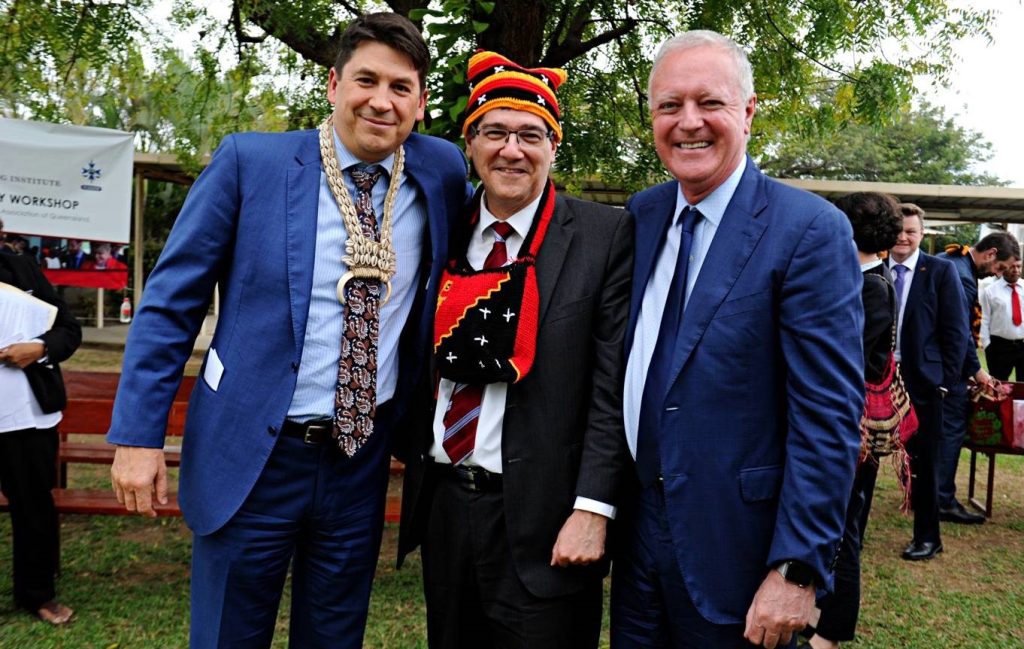
Judge Bernard Porter KC, Mal Varitimos KC and Andrew Crowe KC
The attendance at the LTI for the 9 months course, and passing the course, is a prerequisite to admission to the PNG legal profession. There is a long waiting list for admission to the LTI course. The consequence is that many law graduates need to wait for a number of years before acceptance into the course.
The activities of the Committee will be the subject of separate articles in Hearsay. Significantly, since 2012, two or three places have been made available for PNG lawyers to attend each Queensland Bar Practice Course.
My observations, from appearing with and against many of the former students, reinforces the benefits of the training are significant.
As indicated above, it should be appreciated that PNG has a fused profession and there is no independent bar. Hence there is no PNG Bar association. The vast majority of those who practise in Papua New Guinea have less than 12 years experience. Very few practitioners in private practice have over 25 years experience.
Overseas silk are recognised by the judges and other practioners as such, although silk are not appointed in PNG. Interestingly, the National Court Rules provide in substance that the costs of overseas counsel may only be allowed on taxation if they are certified by the judge.
There are two major issues I have identified that, in my opinion, need addressing regarding the legal profession in PNG. First, there is no system of compulsory CPD. Secondly, there is a lack of mentoring, whether formal or informal. Fortunately my regular appearances in PNG have provided me the perfect and enriching opportunity to mentor lawyers in PNG. I have found the lawyers, especially the less experienced lawyers, particularly keen to learn.
Court Attire in PNG
Anyone who appears in the PNG courts should be familiar with the Professional Conduct Rules. It has some provisions which are unusual for those who practise in Queensland. For example, it contains a Rule that a lawyer must:
“appear in court wearing a long-sleeved clean ironed opaque white shirt or blouse with collar closed at throat and dark trousers or rami, laplap or a shirt and business shoes”.
Although such Rule makes provision for counsel wearing a gown, bib and wig, apart from overseas counsel, local lawyers generally only wear a gown and bib. The National and Supreme Court judges wear gowns, bar jackets, bibs and wigs in all matters, even interlocutory hearings.
The Rule regarding the wearing of white shirts is taken very seriously. About 25 years ago, a silk from New South Wales (“NSW”), who only occasionally appeared in the PNG courts, was wearing a non-white shirt. The judge questioned him on the colour of his shirt and what colour shirts those at the NSW bar wore. The silk thought the judge was complimenting him. That was until the judge ordered he was to change his shirt forthwith or he would be cited for contempt. His junior, also from the NSW bar, was quick to make sure his gown covered his coloured shirt.
One former judge … found his associate in contempt for making errors with his accommodation and plane bookings in relation to a case on circuit.
It should be observed that judges in PNG have not uncommonly held lawyers in contempt of court. In one instance a judge wanted to cite a lawyer for contempt because he was not properly attired. One former judge also found his associate in contempt for making errors with his accommodation and plane bookings in relation to a case on circuit.
Strong Presence of Qld Bar members in PNG Courts and Tribunals
Since independence (and of course, prior to that time) the PNG profession has had a strong association with members of the Qld bar.
Past or present members of the Qld bar who both lived and worked in PNG at one or another time since or shortly before independence include John Baulch, Brian Cassells, Kevin Egan, John Everingham, John Griffin, Brian Hoath, Kevin McCreanor, lan Molloy, Rob O’Regan, Goodwin Poole, Norris Pratt, Eric Pratt, Pat Shanahan, Clive Wall and Jim Williams.
Past or present members who appeared at one or another time in PNG Courts or Tribunals since or shortly before independence, in addition to those mentioned in the above paragraph, include Manus Boyce, Frank G Brennan, John Byrne, lan Callinan, Peter Connolly, Marshall Cooke Snr, David Cooper, Richard Cooper, Gary Crooke, James Crowley, John Cunningham, Geoff Davies, Robert Douglas, Greg Egan, Paul Favell, lan Gzell, Levente Jurth, Dominic Katter, Jack Kelly, Terry Lambert, Bernie McLauchlan, Con McLauchlan, Dan Ryan, Des Sturgess, Bill Pincus, Manuel (Mal) Varitimos, Michael White, Syd Williams Snr. Some of these lawyers only appeared on one or two occasions. In addition,
The Hon Margaret White AO presided as one of two Commissioners in a Commission of Inquiry conducted in PNG in 2021 and 2022.
Of course, many of the lawyers mentioned above were at the time silk, or subsequently took silk. A number were appointed to the bench in Australia or PNG.
I may well have missed mentioning someone. If so, I apologise. Many of the cases are not reported in PNG and difficult to access so as to identify counsel. That makes identifying the names of counsel for this article more difficult.
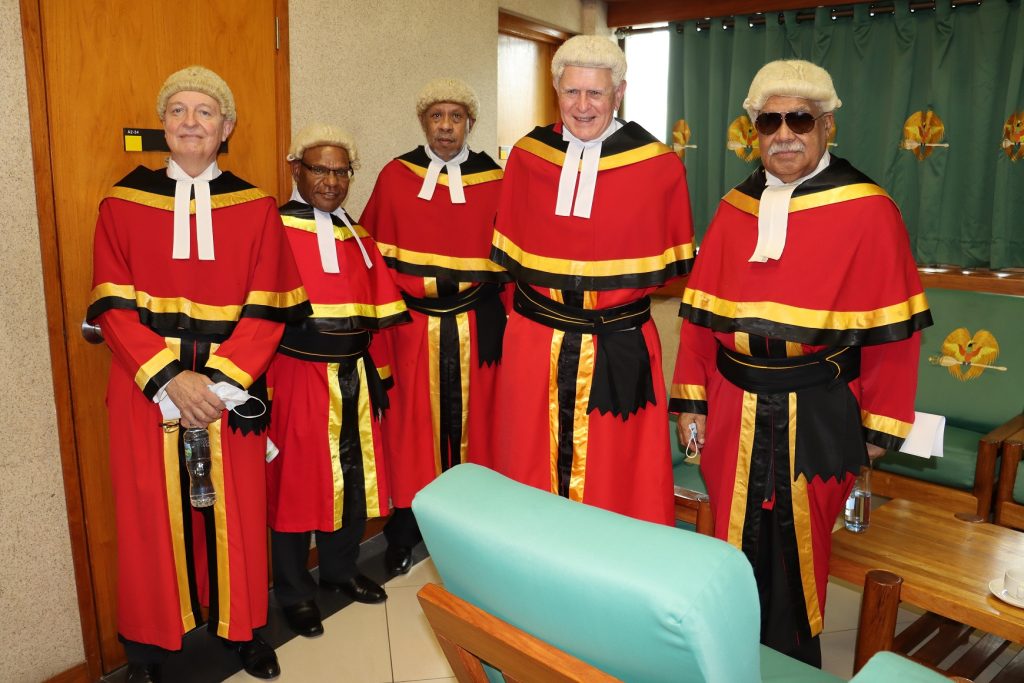
Hartshorn J, Kandakasi DCJ, Kariko J, Logan J, Gavara J awaiting entry to Parliament Chamber – State Opening 2022.
In July 1959, the year after first visiting PNG, Robin Stanley O’Regan – now Rob O’Regan KC – was appointed “to be an Associate to a Judge of the Supreme Court” by instrument signed by the then Minister of State for Territories (Paul Hasluck). Rob subsequently took up positions as an associate to Justices Kelly and Gore, as well as Chief Justice Mann (who was from the Victorian bar).
In 1960, Rob was admitted in both PNG and Queensland. He initially worked, after completing his associateships, at the Crown Law Office from 1961 until about 1962, after which he commenced with the newly established Public Solicitors Office in PNG.
While at the Public Solicitors Office (“PSC”) from about 1963-1965 he regularly travelled around the country, often in light aircraft. His first case was defending 16 alleged murderers, who were convicted and found to be cannibals. After leaving the PSC , he worked in Rabaul in private practice as a litigation lawyer with Warner Shand Lawyers, and studied for one year at Oxford. Rob commenced work in 1968 at the University of Papua New Guinea as a senior lecturer and subsequently a professor.
It is at that time that he commenced a long friendship with John Griffin (later John Griffin QC). Rob and John had the right to private practice during this time, and regularly appeared in high profile cases. Rob told me he gained tremendous experience in his early years in PNG appearing in complex and interesting cases.
In the 1970s Rob taught at Monash University Law School as an associate professor and subsequently as a professor and Head of the University of Queensland Law School . During this time, he occasionally appeared in cases or provided advice in PNG-related matters. After admission to the Qld bar in about 1980, for at least 20 years, Rob would travel to PNG about six times a year to appear in significant cases.
About 20 years ago I appeared with Rob in his last case as his junior in Kokopo (near Rabaul). We visited Rabaul where he previously resided and worked. Sadly, particularly for Rob, most of the buildings in Rabaul had been destroyed or demolished following volcanic eruptions.
In 1968, Victorian John Griffin took up an appointment as senior lecturer in law and subsequently an associate professor of law at the University of Papua New Guinea law school. I understand John was Secretary of the law school social club and President of the University staff club. They were, unsurprisingly, regarded as the best and most active social clubs in the country.
John practised in Papua New Guinea regularly from that time until his passing in 2021. He was often referred to in PNG as the “grandfather of the profession”. In 1997, when I was first admitted in PNG with Marshall Cooke QC, I recall John telling me that there was only one or two judges on the bench at that time whom he and Rob O’Regan had not taught at the law school.
When appearing as junior to John Griffin, before a judge who was a former student of John’s in relation to a property law matter, he told me during the hearing he “taught everything the judge knew about the subject”. He soon retracted this when we lost the case on what John regarded as a clearly erroneous interpretation of the law. John suggested the judge must have fallen asleep during his lecture on the subject as he could not otherwise explain the decision!
In about 2007 John and I volunteered to give some presentations for the PNG Law Society. The Society said no lectures had ever been given to the lawyers in the Lae area, certainly not for many years. John and I gave a full day of lectures in Lae on a Friday. The courts in and within about 120 km of Lae were closed so the lawyers and judicial officers could attend. There were over 100 lawyers in attendance. One of the judges explained to attendees the significance of John being a “QC”.
To the delight of John, he was swarmed at the luncheon break with lawyers wanting his autograph. So much so, he did not have lunch. There was a lawyer that must have felt some sympathy for me, so he asked me for my autograph. This lack of interest at least allowed me to enjoy a pleasant lunch!
As it transpired, we checked out of the hotel and rushed to the airport Friday night to travel to Port Moresby as we were scheduled to give the presentations in the capital on the Saturday. The land of the unexpected struck. The plane did not depart that evening. The hotel we checked out of was booked out when we tried to book back in, and no other suitable accommodation was available. We slept on the seating at the airport. The only food at the airport was tinned tuna. We had no can opener.
The next morning John and I departed for Port Moresby and gave our presentations to a large audience of lawyers at the Crown Plaza hotel. Our presentations were well received and appreciated.
They were difficult times in the history of PNG , with major riots and looting. The rule of law was under challenge.
In February 1976, Ian Molloy was admitted in PNG, following his admission in NSW a few years earlier. He resided and worked as a barrister and solicitor at Craig Kirke & Wright in Port Moresby from 1976-1979. Ian moved at the end of 1979 to Queensland but has continued to regularly appear in PNG since that time. His mentoring of PNG lawyers has been acknowledged by several PNG judges at their swearing-in ceremonies. He told me that during a murder trial in the PNG highlands a few years ago, the State prosecutor had him autograph his copy of Carter’s Criminal Law, which is a reflection of his standing in the profession.
Apart from appearing in the PNG Courts, Ian has appeared as lead counsel assisting and for interested parties in numerous Commissions of Inquiry. The most high profile is probably the Sandline Commission of Inquiry in 1997.
Given his experience in PNG, it is unsurprising that Ian has given expert evidence on PNG matters not only in cases in Australia, but also New Zealand, the United Kingdom and the United States.
In 1997, Marshall Cooke QC and I were admitted in PNG to represent then Prime Minister, Sir Julius Chan, and the government in the Sandline Commission of Inquiry. They were difficult times in the history of PNG , with major riots and looting. The rule of law was under challenge. The politicians were barricaded in Parliament by members of the defence force. They were released on condition that an independent commission of inquiry be held. Fortunately, the commission of inquiry, followed by a subsequent commission of inquiry by the new government, largely settled the upheaval.
Marshall and I appeared together in many cases in PNG after 1997 (and sometimes against each other). He was very much sought after as counsel, for good reason, particularly in constitutional and political cases both in terms of appearing in court and providing advice.
Marshall also appeared in various commissions of inquiry. He was the chair of the Commission of Inquiry into the Privatisation of Finance Pacific Ltd and the sale of the Papua New Guinea Corporation. This was a complex and politically charged Inquiry.
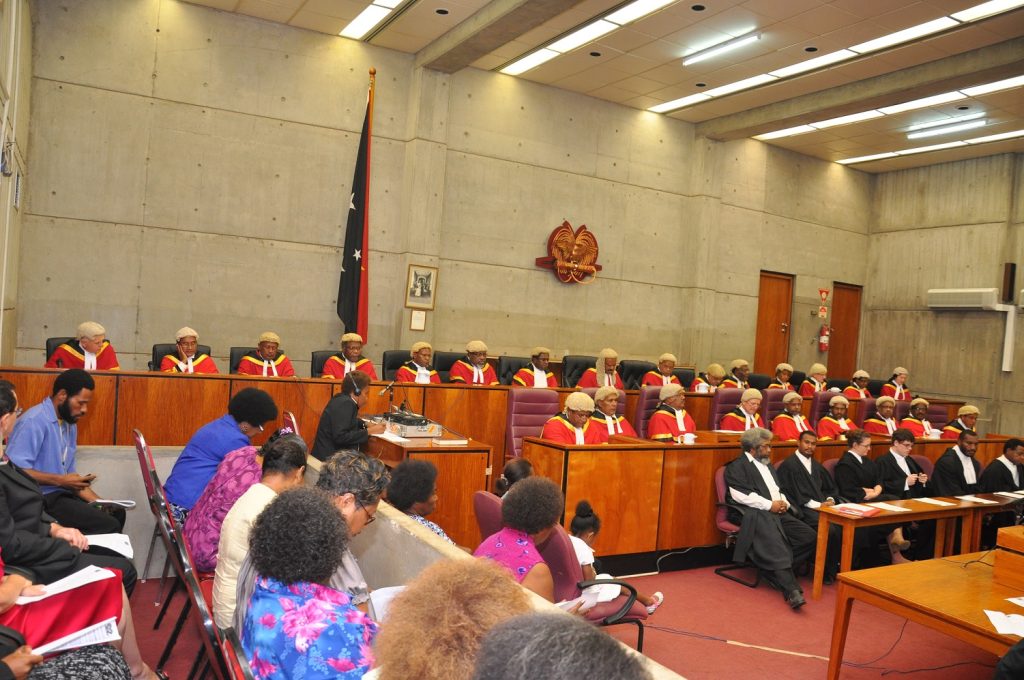
Welcome Ceremony for Collier and Logan JJ. December 2011.
Respect of the Courts in PNG
What is pleasing and apparent is that the citizens of PNG generally very much trust and admire the judiciary and are happy to resolve their disputes via the courts.
Appeals from National Court decisions, both in terms of substantive decisions and matters of practice and procedure, are common. Election Petitions are prevalent.
Usually, following each National election, which elections are held every five years, there are more Election Petitions than seats. This is because numerous candidates file Election Petitions for the same electorate. Supporters, sometimes in the thousands, will attend Election Petition hearings and wait outside the courts (even for directions hearings).
Admission in PNG
Admission in PNG as a lawyer is fairly onerous and difficult.
Among other things, a proposed applicant who has been admitted in a particular country such as Australia is required, as a prerequisite to admission, to undertake exams in various subjects such as constitutional law and customary law. The applicant must travel to PNG to sit the exams. The Attorney-General may provide an exemption, which is extremely difficult to obtain.
Most legal practitioners are sole practitioners. That said, the firms the Qld bar would be familiar with who have offices in PNG are Allens, Ashurst, Corrs Chambers Westgarth and Dentons. At one time, Norton Rose had an office, but they no longer do so. More often than not it is lawyers in Australia, from those firms, who seek to be admitted in PNG.
Significant Changes to PNG Court Hierarchy
It is envisaged that constitutional and other amendments will pass this year to enable a new hierarchy of courts in PNG similar to that in Australia. That is, it is proposed to have a trial court, an intermediate appellant court and a high court. Judges will only be appointed to one of the three courts. The relevant legislation, including proposed constitutional amendments are presently before Parliament. The Court Restructure Bill was tabled in Parliament on 15 February 2024.
In anticipation of the new court hierarchy being established, a modern and state of the art courthouse is being built next to the current courthouse. It is anticipated that parts of the new court building, construction of which was commenced several years ago, will become operational within a few months, with the official opening of the complex next year.
It is envisaged that constitutional and other amendments will pass this year to enable a new hierarchy of courts in PNG similar to that in Australia.
The existing court house is now clearly inadequate. It was officially opened by Her Majesty the Queen on Wednesday 27 February 1974. The majority of judges share chambers. It has no lift and also has issues with airconditioning. The library is extremely small and inadequate for the size of the judiciary and profession.
The increase in the number of judges that may be appointed from 40 to 60 is, in part, in anticipation of the new court hierarchy being established and the need for more judges to be appointed. It is expected a number of judges from other Commonwealth countries will be appointed over the next 12 months, with some Queensland based lawyers to be imminently appointed.
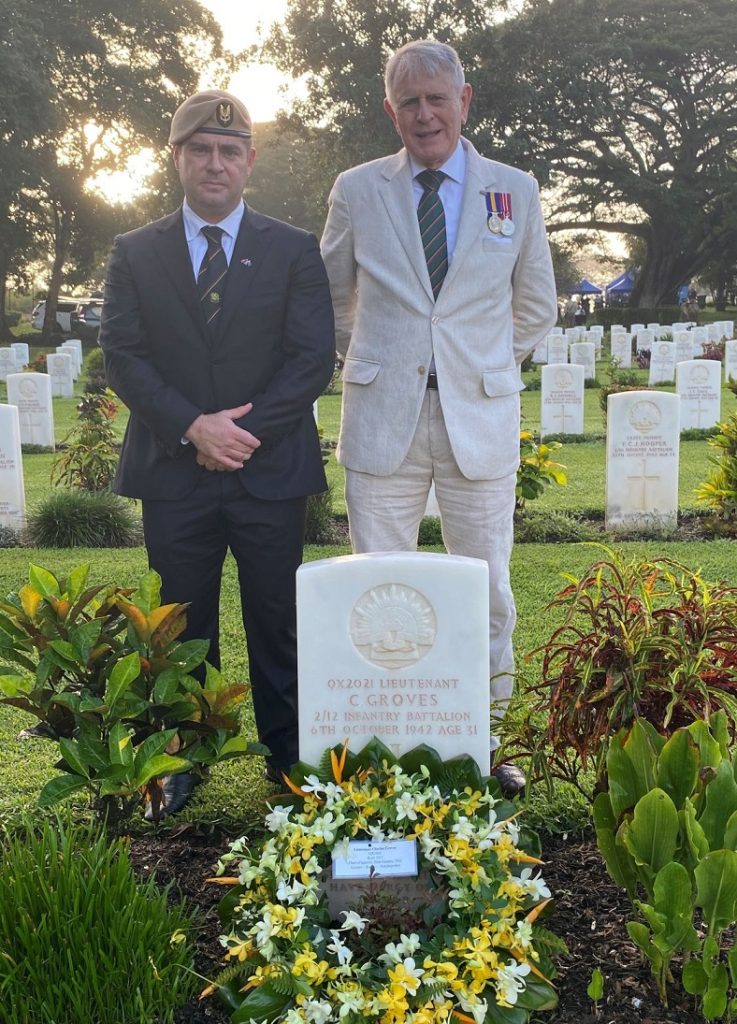
LT Charles Groves Grave site. ANZAC Day 2023. Associate E Donaldson and Logan J.
Conclusion
The land of the unexpected is a fascinating place. Having said that, it is a challenging jurisdiction.
In terms of litigation, disputes arise which ordinarily would not arise in Australia (particularly given the very unique facts underlying them).
I have gained much and invaluable experience from appearing in the PNG courts and in commissions of inquiry. I have also made many life long friends. For all of this I am most grateful.
Following submission of the article, there was announced the appointment of Ms Karen Carmody of the Qld bar as a Judge of the National Court of PNG for a period of 3 years commencing on the date of declaration of office by the Governor General. Hearsay congratulates Ms Carmody on her worthy appointment and wishes her well.


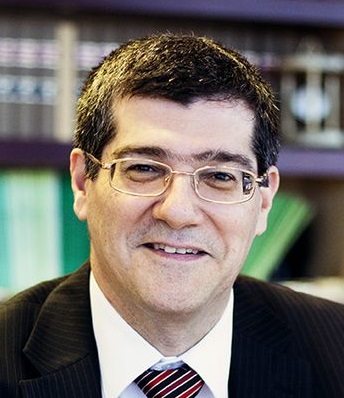
 Logan, Collier and Kassman JJ and members of clan of Kassman J.
Logan, Collier and Kassman JJ and members of clan of Kassman J.
 Judge Bernard Porter KC, Mal Varitimos KC and Andrew Crowe KC
Judge Bernard Porter KC, Mal Varitimos KC and Andrew Crowe KC
 Hartshorn J, Kandakasi DCJ, Kariko J, Logan J, Gavara J awaiting entry to Parliament Chamber – State Opening 2022.
Hartshorn J, Kandakasi DCJ, Kariko J, Logan J, Gavara J awaiting entry to Parliament Chamber – State Opening 2022.
 Welcome Ceremony for Collier and Logan JJ. December 2011.
Welcome Ceremony for Collier and Logan JJ. December 2011.
 LT Charles Groves Grave site. ANZAC Day 2023. Associate E Donaldson and Logan J.
LT Charles Groves Grave site. ANZAC Day 2023. Associate E Donaldson and Logan J.